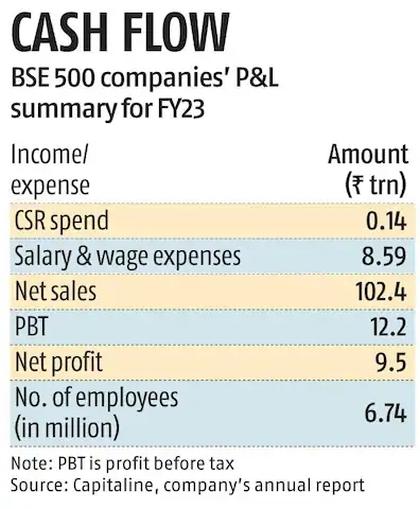'India's top companies currently lack the organisational wherewithal to hire and train 2 million interns annually, given their current scale of operations and existing employee base.'

India Inc's annual expenditure on corporate social responsibility (CSR) projects is more than sufficient to cover the cost of hiring and training 10 million interns over the next five years, according to this year's Union Budget, presented on July 23.
One of its proposals is that India's 500 largest companies will be encouraged to hire 2 million interns a year for the next five years, with the option to use CSR funds to cover 10 per cent of the annual costs associated with these internships.
According to the Companies Act, 2013, companies are required to spend at least 2 per cent of their average net profit over the preceding three years on CSR activities and projects.
Under the programme proposed in the Budget, each intern will receive a monthly allowance of Rs 5,000 for a year, in addition to a one-time financial assistance of Rs 6,000 for incidental expenses.
The companies are expected to bear only 10 per cent of the monthly allowance; the rest will come from taxpayers as subsidy.
Each company will contribute Rs 500 a month to an intern from its CSR fund, and the government will cover the remaining Rs 4,500.
The companies are also expected to bear the cost of the training and administrative expenses.
A back-of-the-envelope calculation suggests that the BSE 500 companies -- India's top 500 listed companies -- could hire up to 2.37 million interns annually using just 10 per cent of their annual CSR expenditure.
In 2022-2023 (FY23), these companies spent nearly Rs 14,200 crore (Rs 142 billion) on CSR projects, a sum sufficient to pay the monthly stipend of Rs 500 to 23.7 million interns.
Annual corporate data from Capitaline reveals that BSE 500 companies reported a combined net profit of Rs 7.83 trillion on average from 2020-21 through FY23.
In comparison, Budget 2024 has allocated Rs 19,000 crore (Rs 190 billion) for the internship programme in 2024-2025.

Experts observe that the main challenge with the scheme lies in the absorption capacity of India Inc, rather than its financial impact on the companies' profit and loss accounts.
"India's top companies currently lack the organisational wherewithal to hire and train 2 million interns annually, given their current scale of operations and existing employee base. Fortunately, the scheme is voluntary, and interested companies may leverage the financial incentives announced in the Budget to hire and train interns for future needs," says Rituparna Chakraborty, co-founder and non-executive director at TeamLease Services, one of India's largest staffing companies.
As of the end of FY23, BSE 500 companies had a combined workforce of 6.74 million, a 5 per cent increase from the 6.4 million at the end of FY22.
However, not all employees are based in India; a meaningful number works in the overseas subsidiaries of major Indian multinationals such as Tata Consultancy Services, Infosys, Wipro, Tata Motors, Tata Steel, Bharti Airtel, and Samvardhana Motherson.

Slackening of growth
Analysts argue that it is impractical for companies to swell their workforce by nearly a third within a year.
"The recent employment survey and growth in listed companies' salaries and wages expenses indicate that the pace of new hiring is pointedly slower than the Budget's target. Besides, companies in recent years have been focusing on rationalising employee costs through investments in labour-saving technologies like automation and digitisation," says Dhananjay Sinha, co-head of research and equity strategy at Systematix Institutional Equities.
The BSE 500 companies collectively spent Rs 8.59 trillion on salaries and wages in FY23, up 15.2 per cent from Rs 7.46 trillion in FY22.
Madan Sabnavis, chief economist at Bank of Baroda, also believes the scheme may fall short of its target.
"Most of the recent hirings in the corporate sector have been in service industries such as information technology, banking and finance, and retail. These sectors are now facing a slackening of growth, greatly reducing their need for new hires," he says.
India Inc's seven largest employers, with a total employee base of 2 million in FY23, added only 45,000 to their headcount in FY24.
This sample includes TCS, Infosys, Wipro, HCLTech, Coal India, State Bank of India, and HDFC Bank.
Feature Presentation: Rajesh Alva/Rediff.com












 © 2025
© 2025